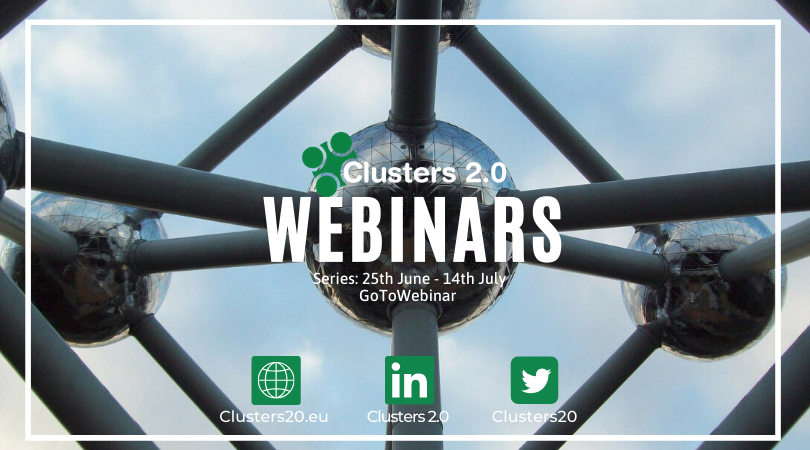
With the physical conference cancelled due to COVID-19, Clusters 2.0 final event will take place online through a series of webinars.
Clusters 2.0 free series of webinars will look at the project main solutions and innovations towards more sustainable, more cooperative, more efficient logistics in Europe.
After three years of intense cooperation, the Clusters 2.0 partners will present their latest results advancing sustainable logistics. Distinguished speakers from top businesses and institutions will engage the audience in a stimulating discussion revolving around IT technologies, physical internet, cooperation and sustainability, among other topics. You will also have the unique opportunity to meet the experts behind Clusters 2.0 solutions.
Can’t attend a webinar? You can retrieve the full recording on our YouTube channel and the presentation deck on our dedicated page.
Opening webinar on Clusters 2.0: Rethinking collaboration, connectivity and modularization
Date and time: 25th June 2020, 15:00 CET
Organisers: Marcel Huschebeck, PTV Group
What are Clusters 2.0 main achievements? What is their impact on logistics operations and business processes? Distinguished speakers from top businesses and logistics platforms will engage in a stimulating discussion about the project legacy towards more sustainable, more cooperative and more efficient logistics in Europe.
Cloud-based platform collaboration in airport clusters
Date and time: 30th June 2020, 15:00 CET
Organisers: Hilde Havermans, Nallian
How can community building around a collaborative cargo cloud increase the overall competitiveness of an airport cluster? Logistics needs to put users at the core of operations. “Clusters 2.0” will prove that a flexible, user-centred logistics is possible, for example by using its SlotBooking App in airports.
NMLU a Clusters 2.0 innovation – fast, efficient and smart
Date and time: 2nd July 2020, 15:00 CET
Organisers: Michael Koscharnyj, Fraunhofer IML
New Modular Load Units are about modularization, bundeling and intermodality. The webinar introduces the packaging innovation with Clusters 2.0 container, horizontal shift system and new modular load units to drive efficiency in logistic networks and providing a basis for an interconnected logistics clusters in future.
Logistics clusters as a foundation for collaboration and modal shift
Date and time: 7th July 2020, 15:00 CET
Organisers: Marc Verelst, P&G
To drive a modal shift, Clusters 2.0 has developed the Massification Concept which consists of Massification Workshops, the Quickceck Tool and the X-Intermodal Tool. The Quickcheck Tool visualizes transportation flows, while the X-Intermodal Tool proposes intermodal transportation options. Both are discussed in the Massification Workshops.
Cloud-based Platform Collaboration in Intermodal Clusters
Date and time: 9th July 2020, 15:00 CET
Organisers: Giuseppe Dall’Asta, Interporto Bologna
Collaboration among terminals and intermodal nodes can be the cornerstone for exploiting the intermodal sector. How to build such collaboration? Creating Proximity Terminals Networks and large Logistics Clusters, implementing IT tools and involving all the relevant stakeholders together.
Logistics Clusters – Key drivers for the European Green Deal
Date and time: 14th July 2020, 15:00 CET
Organisers: Carlo Vaghi, FIT Consulting
CLUSTERS 2.0 innovations proved to be technically feasible and potentially able to disrupt the logistics and intermodal transport market. How do they improve the supply chain performance for shippers and logistics operators? What is their impact on users and society, and how do they address EU Green Deal objectives? How will the innovation portfolio and business models of CLUSTERS 2.0 be scaled-up?
Want to meet the panellists? Join our LinkedIn group!

